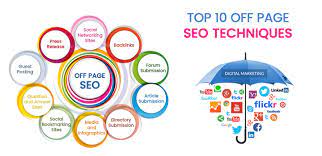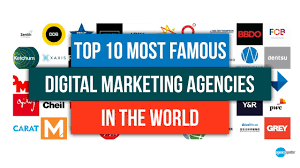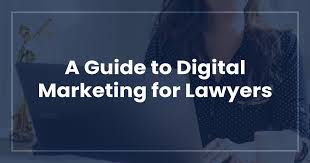The Importance of On-Page Optimization in Digital Marketing
When it comes to digital marketing, on-page optimization plays a crucial role in determining the success of your online presence. On-page optimization refers to the process of optimizing individual web pages to rank higher and earn more relevant traffic in search engines. It involves various elements such as content, HTML source code, and site architecture that can be tweaked and improved to enhance visibility and user experience.
Key Aspects of On-Page Optimization:
Quality Content: Content is king in digital marketing. Creating high-quality, relevant, and engaging content that resonates with your target audience is essential for on-page optimization. This includes using relevant keywords strategically throughout your content to improve search engine rankings.
Title Tags and Meta Descriptions: Optimizing title tags and meta descriptions with relevant keywords can significantly impact your click-through rates from search engine results pages (SERPs). These elements provide a brief preview of your page’s content to users, so make them compelling and informative.
URL Structure: A clean and descriptive URL structure not only improves user experience but also helps search engines understand the relevance of your page content. Include target keywords in your URLs to boost SEO performance.
Internal Linking: Linking relevant pages within your website helps search engines navigate and index your site more effectively. Internal linking also improves user engagement by guiding visitors to related content on your site.
Benefits of On-Page Optimization:
Improved Search Engine Rankings: By implementing on-page optimization strategies, you increase the chances of ranking higher in search engine results for relevant keywords, driving more organic traffic to your website.
Enhanced User Experience: Optimizing on-page elements such as content, navigation, and page speed improves user experience, leading to lower bounce rates and increased engagement on your website.
Higher Conversion Rates: When users find what they are looking for easily on your optimized web pages, they are more likely to convert into leads or customers. This can result in improved conversion rates and ultimately higher ROI for your digital marketing efforts.
In Conclusion
On-page optimization is a fundamental aspect of digital marketing that should not be overlooked. By focusing on creating valuable content, optimizing technical elements, and enhancing user experience on your web pages, you can drive organic traffic, improve search engine rankings, and achieve better results from your online marketing campaigns.
Comprehensive Guide to On-Page Optimisation: 19 Frequently Asked Questions in Digital Marketing
- What is off page optimization in digital marketing?
- What is on-page optimization and off-page optimization in digital marketing?
- What is called on-page optimization?
- Why on page optimization is important?
- What are the five most important on page optimization factors?
- What is on page and off-page optimization?
- What is the on-page optimisation process of SEO?
- What is on page optimization in digital marketing?
- What is on-page optimization as an SEO strategy?
- What are the 3 primary components of on-page optimization?
- What are examples of on page optimization factors?
- What is on page optimization and off-page optimization in digital marketing?
- What is on page Optimisation in digital marketing?
- What is on page SEO with example?
- What is on-page optimization techniques?
- What is on page in digital marketing?
- What is on-page Optimisation technique?
- What is on page and off-page optimization in digital marketing?
- What is off-page optimization in digital marketing?
What is off page optimization in digital marketing?
In digital marketing, off-page optimization refers to the strategies and techniques used outside of a website to improve its search engine rankings and online visibility. Unlike on-page optimization, which focuses on enhancing elements within a website, off-page optimization involves activities such as link building, social media marketing, and influencer outreach to establish a website’s authority and credibility across the web. Off-page optimization plays a vital role in improving a site’s reputation, driving organic traffic, and ultimately boosting its performance in search engine results pages (SERPs).
What is on-page optimization and off-page optimization in digital marketing?
In digital marketing, on-page optimization and off-page optimization are two key strategies that play a vital role in improving a website’s visibility and performance in search engine results. On-page optimization focuses on enhancing individual web pages by optimizing content, meta tags, URL structure, and internal linking to improve search engine rankings and user experience. In contrast, off-page optimization involves activities outside the website itself, such as building backlinks from reputable sources, social media marketing, and influencer collaborations to increase domain authority and drive traffic to the site. Both on-page and off-page optimization are essential components of a comprehensive digital marketing strategy aimed at boosting online presence and attracting relevant audiences.
What is called on-page optimization?
On-page optimization in the realm of digital marketing refers to the strategic process of enhancing individual web pages to improve their visibility and ranking in search engine results. It involves fine-tuning various elements on a webpage, such as content quality, meta tags, URL structure, and internal linking, to make them more search engine-friendly and user-centric. By focusing on on-page optimization techniques, businesses aim to attract more relevant traffic to their websites, increase their online visibility, and ultimately drive better engagement and conversions from their target audience.
Why on page optimization is important?
In the realm of digital marketing, the significance of on-page optimization cannot be overstated. It plays a pivotal role in enhancing a website’s visibility and relevance in search engine results. By focusing on elements such as quality content, strategic keyword placement, and user-friendly website structure, on-page optimization not only improves search engine rankings but also enhances user experience. Ultimately, investing in on-page optimization is crucial for attracting organic traffic, increasing website engagement, and achieving better overall performance in digital marketing efforts.
What are the five most important on page optimization factors?
When it comes to on-page optimization in digital marketing, understanding the five most important factors can make a significant difference in your online visibility and success. The key factors include quality content that is relevant and engaging to the target audience, strategically optimized title tags and meta descriptions with relevant keywords, a clean and descriptive URL structure that includes target keywords, effective internal linking to improve site navigation and user engagement, and mobile responsiveness for a seamless user experience across devices. By focusing on these crucial on-page optimization factors, businesses can enhance their search engine rankings, drive organic traffic, and ultimately achieve better results from their digital marketing efforts.
What is on page and off-page optimization?
In the realm of digital marketing, the distinction between on-page and off-page optimization is a common query among businesses seeking to enhance their online presence. On-page optimization refers to the strategies and techniques implemented directly on a website to improve its search engine visibility and user experience. This includes content creation, keyword placement, meta tags, and internal linking. On the other hand, off-page optimization involves activities conducted outside the website to boost its authority and credibility in the eyes of search engines. Off-page optimization typically encompasses link building, social media engagement, and influencer partnerships. Understanding the nuances of both on-page and off-page optimization is essential for developing a comprehensive digital marketing strategy that drives organic traffic and maximizes online visibility.
What is the on-page optimisation process of SEO?
The on-page optimization process of SEO involves a series of strategic steps taken to enhance individual web pages for better search engine visibility and user experience. This process typically includes tasks such as creating high-quality and relevant content, incorporating target keywords effectively, optimizing title tags and meta descriptions, improving URL structure, implementing internal linking strategies, and ensuring overall site performance. By focusing on these elements, businesses can improve their search engine rankings, attract more organic traffic, and ultimately drive better results from their digital marketing efforts.
What is on page optimization in digital marketing?
On-page optimization in digital marketing refers to the strategic process of enhancing individual web pages to improve their visibility and performance in search engine results. It involves various techniques such as creating high-quality content, optimizing meta tags, improving URL structures, and implementing internal linking strategies. By focusing on on-page optimization, businesses can increase their chances of ranking higher in search engine results pages (SERPs), attracting more organic traffic, and ultimately achieving better online visibility and engagement with their target audience.
What is on-page optimization as an SEO strategy?
On-page optimization, as an SEO strategy in digital marketing, refers to the practice of enhancing individual web pages to improve their search engine rankings and attract relevant organic traffic. This process involves fine-tuning various elements on a webpage, such as content, meta tags, URL structure, and internal linking, to make them more search engine-friendly and user-friendly. By strategically incorporating target keywords and providing valuable, high-quality content, on-page optimization aims to boost a website’s visibility in search engine results pages (SERPs) and ultimately drive more qualified traffic to the site. It is a fundamental aspect of SEO that plays a crucial role in improving a website’s online presence and overall performance in search engine rankings.
What are the 3 primary components of on-page optimization?
In the realm of digital marketing, understanding the three primary components of on-page optimization is essential for achieving success in improving search engine rankings and enhancing user experience. The first key component is quality content, which involves creating relevant and engaging material that incorporates strategic use of keywords. The second component includes optimizing title tags and meta descriptions with targeted keywords to attract users from search engine results pages. Lastly, maintaining a clean and descriptive URL structure with integrated keywords helps search engines comprehend the relevance of page content, ultimately contributing to a well-rounded on-page optimization strategy.
What are examples of on page optimization factors?
In digital marketing, examples of on-page optimization factors include quality content that incorporates relevant keywords strategically, title tags and meta descriptions that are optimised with target keywords for improved click-through rates, a clean and descriptive URL structure that enhances user experience and search engine understanding, internal linking to guide users to related content within the website, and mobile responsiveness to cater to the growing mobile user base. These factors play a crucial role in improving search engine rankings, enhancing user experience, and ultimately driving better results for online marketing efforts.
What is on page optimization and off-page optimization in digital marketing?
In digital marketing, on-page optimization and off-page optimization are two essential strategies that work hand in hand to improve a website’s visibility and ranking in search engine results. On-page optimization refers to the process of optimizing individual web pages by focusing on elements such as content quality, keyword usage, meta tags, and internal linking to enhance search engine rankings and user experience. On the other hand, off-page optimization involves activities conducted outside the website, such as link building, social media engagement, and influencer partnerships, to increase a site’s authority and credibility in the eyes of search engines. Both on-page and off-page optimization are crucial for a comprehensive digital marketing strategy that drives organic traffic and boosts online presence effectively.
What is on page Optimisation in digital marketing?
On-page optimization in digital marketing refers to the strategic process of enhancing individual web pages to improve their visibility and ranking on search engine results pages (SERPs). It involves fine-tuning various elements within a webpage, such as content, meta tags, URL structure, and internal linking, to make them more search engine-friendly and user-friendly. By focusing on on-page optimization techniques, businesses can increase their chances of attracting relevant organic traffic, improving user experience, and ultimately achieving better online visibility and conversion rates.
What is on page SEO with example?
In the realm of digital marketing, on-page SEO refers to the practice of optimizing individual web pages to improve their search engine rankings and attract more relevant traffic. This involves various strategies such as creating high-quality content, using relevant keywords effectively, optimizing meta tags, and improving site structure. An example of on-page SEO would be a website that regularly updates its blog with informative and engaging articles related to its industry, incorporating relevant keywords naturally throughout the content. Additionally, ensuring that each blog post has a well-crafted meta description and title tag that accurately reflects the content can further enhance the page’s visibility in search engine results. By implementing these on-page SEO techniques consistently, businesses can increase their online visibility and drive more organic traffic to their website.
What is on-page optimization techniques?
On-page optimization techniques in digital marketing refer to the strategies and practices used to enhance individual web pages for better search engine visibility and user experience. These techniques involve various elements such as creating high-quality and relevant content, optimizing title tags and meta descriptions with targeted keywords, structuring URLs effectively, implementing internal linking to improve navigation, and ensuring a seamless user experience. By employing on-page optimization techniques, businesses can improve their search engine rankings, attract more organic traffic, and ultimately drive better results from their digital marketing efforts.
What is on page in digital marketing?
In the realm of digital marketing, the concept of “on-page” refers to the process of optimizing individual web pages to enhance their visibility and relevance in search engine results. On-page optimization involves refining various elements within a webpage, such as content quality, meta tags, URL structure, and internal linking, to improve its performance in search engine rankings. By focusing on these on-page factors, digital marketers can attract more organic traffic to their websites and provide a better user experience for visitors, ultimately leading to increased engagement and conversions.
What is on-page Optimisation technique?
On-page optimization technique refers to the practice of enhancing individual web pages to improve their visibility and ranking in search engine results. This technique involves various strategies such as creating high-quality and relevant content, optimizing title tags and meta descriptions with targeted keywords, structuring URLs effectively, and implementing internal linking within the website. By focusing on these on-page elements, digital marketers can boost their website’s search engine rankings, attract more organic traffic, enhance user experience, and ultimately drive better results for their online marketing efforts.
What is on page and off-page optimization in digital marketing?
In digital marketing, on-page and off-page optimization are two key strategies used to improve a website’s search engine visibility and overall performance. On-page optimization refers to the process of optimizing individual web pages by focusing on elements such as content quality, keyword usage, meta tags, and internal linking to enhance the page’s relevance and ranking in search engine results. On the other hand, off-page optimization involves external factors such as backlink building, social media engagement, and online reputation management to boost a website’s authority and credibility in the eyes of search engines. Both on-page and off-page optimization are essential components of a successful digital marketing strategy aimed at increasing organic traffic, improving search engine rankings, and driving conversions.
What is off-page optimization in digital marketing?
Off-page optimization in digital marketing refers to the strategies and techniques implemented outside of a website to improve its search engine rankings and online visibility. Unlike on-page optimization, which focuses on elements within the website itself, off-page optimization involves activities such as link building, social media marketing, and influencer partnerships to enhance a site’s authority and credibility in the eyes of search engines. By building a strong off-page SEO strategy, businesses can attract more organic traffic, improve their online reputation, and ultimately drive better results in their digital marketing efforts.




